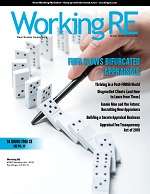 |
“One of the best courses that I have had in 17 years!” -Amy H |
>> Editor’s Note: To help you stay up-to-date and connected, OREP/Working RE has established a Coronavirus (COVID-19) Discussion and Resource Page where you can share your thoughts, experiences, advice and challenges with fellow appraisers. See what Appraisers are saying here!
>> “Coronavirus State of the Appraisal Industry” Survey. Provide Your Industry Feedback.
BREAKING: Coronavirus and Appraisers
By Isaac Peck, Editor
The accelerating spread of the coronavirus (COVID-19) within the United States has created an environment of rapid change for communities and businesses. The result has been a fluid environment where small business owners are scrambling to understand how to protect themselves, their businesses, their employees, and their customers. Real estate appraisers are no different.
According to the Appraisal Institute, over 20 percent of appraisers are over 66 years old, making them particularly vulnerable to becoming severely ill as a result of COVID-19. Working RE has heard from several appraisers who say they have stopped working completely as a result of the virus. And for the many appraisers who are still working, some have encountered borrowers/homeowners who refuse to allow them entry into their homes for fear of the virus as well. Other appraisers, as you will read below, are setting their own rules.
Still Appraising
Bruce Ford, a veteran Calif. State Certified Residential Appraiser who covers the northern San Francisco/Bay Area counties, says his appraisal firm is still open for business, despite a “Stay at Home” order issued by Calif. Governor Gavin Newsom. “We are still serving our longstanding AMCs, our established national Banks/Lenders, our private non-lender and estate clients and we continue honoring our long-term relationship with the VA,” says Ford.
In an email to his clients earlier this week, Ford advised: “Rush orders are rare and extremely expensive. Please don’t ask for one and then be shocked by the price. We bid all jobs based on market complexity, distance and time required for report completion, based on USPAP standards and Fannie Mae Guidelines. Lastly, we are extending our due dates, be prepared and tell your clients.”
Health and Safety
Ford says his appraisal office is taking the California and U.S. Health and Safety measures to pre-qualify his property visits, based on the health of the occupants. “If there is cause, we will cancel the appointment,” Ford reports.
Appraisers are being advised to ask the property contact specific questions when setting the appointment, such as:
• Is anyone in the household currently sick, coughing, or carrying a fever?
• Has anyone in the household recently returned from a foreign country in the past 14 days? Or Seattle, New York or Santa Clara county? (Known HOT SPOTS.)
• Has anyone in the household been in contact with parties who have a confirmed case of Coronavirus?
• Is anyone in your household under mandatory or self-quarantine?
When performing the inspection, the following precautions are recommended for appraisers:
• Avoid shaking hands at the time of inspection.
• Wear masks and/or gloves as needed.
• To prevent surface contact, ask that all light switches be turned on and all doors opened prior to entry.
• Wash your hands and clean your ” tools” thoroughly after each inspection.
• Carry antiseptic wipes/hand gel.
• Leave your shoes outside when you return home.
Ford says he is also requesting that the house be completely empty, with noone present in the home, for his safety and others. Ford cautions appraisers that if they get the right answers when setting the appointment but see signs of sickness when entering the property, they are within their rights to leave and come back at another time, or cancel the appointment.
(story continues)
“Stay at Home” Executive Orders
Yesterday evening (March 19), California Governor Gavin Newsom issued an unprecedented Executive Order (ORDER N-33-20) requiring “all individuals living in the State of California to stay home” unless they are employed in 16 approved Critical Infrastructure Sectors. (Click here for a full list of all 16 Sectors.)
This morning (March 20th), New York Governor Andrew Cuomo issued a similar Executive Order that mandates that New Yorkers statewide “Stay at Home.” Unlike Calif., Cuomo says New York is currently “working through the list of essential services now.” With the situation with Coronavirus (COVID-19) developing so rapidly, it remains to be seen how many other states will adopt similar measures, and when.
In California’s case, “Financial Services” is one of the 16 Critical Infrastructure Sectors that is exempt from Calif. Governor Newsom’s “Stay at Home” Executive Order. Some appraisers and AMCs (and their legal counsel) believe that appraisal services are considered essential business activities, as appraisers support financial institutions in their day-to-day operations, but Working RE has been unable to confirm this. However, some appraisers and AMCs in California are still operating, Ford being one of them.
Market Conditions: Appraising in a Pandemic
In terms of completing the appraisal assignment, many appraisers have been struggling with what to put in the Market Conditions section of the 1004 and which comments to include to accurately capture the market realities of the Coronavirus. Phil Spool, a State-Certified General Real Estate Appraiser in Florida who has been appraising since 1973, says he is including the following comment in all of his appraisals: Due to the current Covid-19 pandemic that is on a national level, an economic effect may affect a listing’s number of days on market and ultimately the sales price of properties that are listed for sale. As this is on a national scale, it would be too difficult to quantify the effects on sales prices of houses currently listed. Therefore, this appraisal makes the extraordinary assumption that the Covid-19 pandemic, also referred to as the Coronavirus, may have a negative effect on the value of the subject property.
Spool says that he is not making any negative adjustments yet, that that highlights the importance of the word “may” in his statement. “If the appraiser states it will have a negative effect, then you have to support that negative adjustment and one cannot support it, at least not yet. The Covid-19 virus is nationwide and most likely WILL have a negative effect but for now, it is too early to determine that. That is why appraisers should use the language I suggest for now and when it can be quantified (dollar adjustment), then modify it,” says Spool.
When it comes to answering the Market Conditions section of the URAR form, Richard Hagar, SRA and renowned appraisal educator, says that appraisers are not hired to predict the future. “Our appraisals are as of a specific date based on information from the past, so no matter what, we will always be behind the immediate reality of ‘this minute.’ However, paying attention to CURRENT market conditions becomes very important. How many listings? How many days’ supply of homes? What is the rate of absorption? Make sure that your appraisals supply current information regarding the number of days on the market and the number of sales per day in the subject’s neighborhood. Also: are values, list prices and/or sales and sales prices, starting to decline? This is no different than previous events such as 9/11, which all impacted the market for a short time after,” says Hagar.
Rapid Industry Changes
A number of individuals at the GSEs (Fannie Mae and Freddie Mac), as well as the Department of Veteran Affairs have indicated that they are collaborating together and in concert with the Federal Finance Housing Agency (FHFA) to develop alternative guidelines for how appraisers can perform valuations in the wake of the rapid spread of the coronavirus nationwide. Earlier today, Joan Trice, founder and CEO of Clearbox, LLC and host of the Collateral Risk Network (CRN), called on the VA, FHA, USDA, Fannie Mae, and Freddie Mac to issue a unified bulletin to address the situation (AppraisalBuzz).
Trice argues against the push towards more appraisal waivers, reporting that the CRN, a prominent organization in the collateral risk space made up of lenders, investors, rating agencies, private mortgage insurers, appraisal management companies (AMCs) and more, is proposing tightening controls of waivers based on the following criteria.
• 70% LTV based upon models.
• No cash out refinances.
• No purchase transactions.
• Only rate and term modifications on seasoned loans.
Trice warns that increasing waivers now “may prove to be disastrous as the crisis right behind the Coronavirus crisis will reveal the overleveraged position of many homeowners. Expanding the waiver program also sends the exact opposite message to the appraisal community. In times of market stress, it is imperative that we rely on the local market expertise of appraisers,” says Trice.
Working RE‘s sources indicate that an announcement from FHFA, the VA, and the GSEs with updated guidelines is expected within the next few days. Stay safe out there.
This is a developing story, please check WorkingRE.com for the latest appraisal news and information.
>> Join the Discussion at OREP/Working RE’s Coronavirus (COVID-19) Discussion and Resource Page where you can share your thoughts, experiences, advice and challenges with fellow appraisers. See what Appraisers are saying here!
>> “Coronavirus State of the Appraisal Industry” Survey. How’s it going?
About the Author
Isaac Peck is the Editor of Working RE magazine and the Vice President of Marketing and Operations at OREP.org, a leading provider of E&O insurance for appraisers, inspectors and other real estate professionals in 50 states. He received his master’s degree in accounting at San Diego State University. He can be contacted at isaac@orep.org or (888) 347-5273.
CE Online – 7 Hours (AQB Approved)
Identifying and Correcting Persistent Appraisal Failures
Richard Hagar, SRA, is an educator, author and owner of a busy appraisal office in the state of Washington. Hagar now offers his legendary adjustments course for CE credit in over 40 states through OREPEducation.org. The new 7-hour online CE course Identifying and Correcting Persistent Appraisal Failures shows appraisers how to avoid CU’s red flags, minimize callbacks, save time, and earn more! Learn how to improve the quality of your reports and build defensible reports! OREP insureds save on this approved coursework. Sign up today at www.OREPEducation.org.
Sign Up Now! $119 (7 Hrs)
OREP Insured’s Price: $99
>Opt-In to Working RE Newsletters
>Shop Appraiser Insurance
>Shop Real Estate Agent
Insurance
Send your story submission/idea to the Editor:
isaac@orep.org




by Doug Perrin
Thanks, but there’s more…
-We need to insist that FNMA/FHMLC temporarily change their guidelines and allow for EXTERIOR INSPECTIONS IMMEDIATELY. We can do it. USPAP allows for it. I understand there are exceptions.. That’s up to the appraiser to make the call. We need this in our tool bag right now. Let’s protect ourselves and the public until this passes. If you agree contact FHFA, FNMA/FHLC, your senator, your lender, or anyone else who will listen. Thanks and stay alive.
by DR
My coverage area is in a hot spot for the virus. Our office conducting exterior appraisals only with phone interview to contact to get an idea of property condition with a extra ordinary disclaimer that interior condition is based from the phone interview.
-